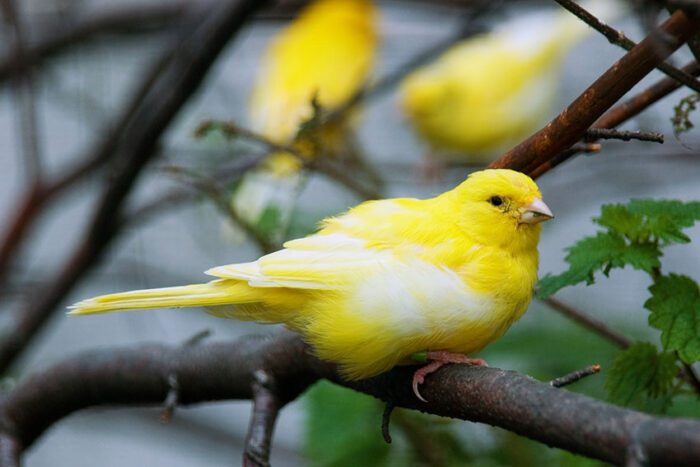Canaries are lively and vocal pet birds that can live 10+ years with proper care. However, respiratory infections are common in canaries and can be fatal if left untreated. As an owner, it is important to recognize the signs of a respiratory infection early and get veterinary treatment for your canary. In this article we talk about Respiratory Infections in Canaries-Signs and Treatment.
Table of Contents
What Causes Respiratory Infections in Canaries?
There are several infectious and non-infectious causes of respiratory disease in canaries:
- Bacterial infections: Common bacteria like Mycoplasma gallisepticum, Klebsiella, and Pseudomonas can infect a canary’s respiratory tract.
- Fungal infections: Aspergillosis is the most common systemic fungal infection in canaries. Inhaled spores of the Aspergillus fungus can grow in the air sacs and lungs.
- Viral infections: Paramyxovirus is a significant viral respiratory pathogen in canaries. It is highly contagious between birds.
- Irritants and toxins: Inhaled smoke, dust, air pollution, scented products, and more can irritate and inflame a canary’s respiratory tract.
- Nutritional deficiencies: Poor diet lacking in vitamins A and E can make a canary prone to chronic respiratory disease.
Stress and old age also contribute by weakening the immune system. New birds brought home without quarantine are a common source of introduction of pathogens into an aviary or cage.
Signs and Symptoms of Respiratory Infection
Catching symptoms early allows treatment to be more effective. Here are the most common signs of respiratory disease in canaries:
- Increased breathing rate or effort
- Straining or tail-bobbing with each breath
- Discharge or crusting around nares (nostrils)
- Sneezing, coughing, or shaking of head
- Loss of voice or changes in vocalization
- Keeping mouth open to breathe
- Loss of appetite, lethargy, fluffed feathers
- Weakness, inability to perch or fly
Your canary may show mild symptoms at first which gradually worsen. Or a severe infection may cause sudden onset of labored breathing, especially on exertion. Get veterinary care immediately if your bird is having breathing difficulties.
Diagnosis of Respiratory Infections
Always consult an avian veterinarian if your canary has respiratory signs. The vet will ask about the bird’s history and do a clinical exam noting symptoms. Common diagnostic tests include:
- Bacterial culture and sensitivity: Identifies bacterial organism and effective antibiotics
- Radiographs (x-rays): Assess lung changes and detect masses or foreign bodies
- Endoscopy: Visualize the air sacs and lungs using a tiny camera
- PCR (polymerase chain reaction) assays: Detect genetic material of pathogens like Poxvirus or Chlamydia
- Blood work: Checks for anemia and aids diagnosis
- Biopsy: Sample of infected lung tissue to identify disease
Based on test results, your vet can pinpoint the exact infection and prescribe appropriate medication.
Treatment of Respiratory Infections
Treatment depends on the underlying cause but usually includes:
- Antibiotics: Bacterial infections are treated with antibiotics suited to the organism based on culture results.
- Antifungals: Aspergillus infections require long courses (6 weeks or more) of oral or nebulized antifungals like itraconazole.
- Nebulization: Delivers medication mist directly into the airways and lungs via a mask. Used for aspergillosis, chronic cases.
- Supportive care: Fluids, nutritional support, warmth and rest are crucial. Reduce stressors.
- Sanitize environment: Thoroughly clean and disinfect cage, food/water bowls and surrounding areas to prevent reinfection.
- Quarantine: Isolate sick bird from other pets until finished with treatment.
Mild cases may resolve with antibiotics and supportive care. Severe infections with extensive lung damage may not respond to medication alone. Consider surgery to debulk fungal masses if suggested by your avian vet.
How to Prevent Respiratory Infections
You can reduce your canary’s respiratory infection risks by taking these key prevention measures:
- Give species-appropriate diet high in vitamins A and E
- Avoid exposure to fumes, strong fragrances and air pollution
- Quarantine new birds for 30-45 days before introducing
- Disinfect cage, bowls, toys weekly with avian-safe products
- Avoid overcrowding and limit stress
- Get regular check ups for your bird even when healthy
- Be alert to subtle signs of illness and seek timely veterinary care
Respiratory infections can progress rapidly in small birds like canaries. But prompt diagnosis and right treatment can help your beloved bird recover and breathe easy again. Prevention is truly worth the effort to help ensure your canary lives a long and healthy life. With attentive care and well-timed veterinary visits, respiratory disease does not have to cut your time together short. I sincerely hope you find this “Respiratory Infections in Canaries-Signs and Treatment” article helpful.

Mina Isabelle, with a Master’s degree in Ornithology and 7 years of research experience, is the lead writer for AllbirdsZone.com. Her deep expertise and passion for avian life shine through her engaging and reliable content on bird species, habitats, and conservation. Mina is committed to providing valuable insights and inspiring bird enthusiasts with every article she crafts.
Follow Mina on Social Media:
Facebook

